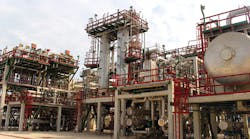West Germany's Bayer AG, BASF AG, and Hoechst AG plan to spend about $1 billion during 1990-93 to expand their businesses in Spain.
Most of the spending will boost their already significant petrochemicals and plastics operations in the country.
The aim is to meet growing domestic demand and increase exports of Spanish-made products, mainly to other European Community nations.
E.I. Du Pont de Nemours Inc. also is moving ahead with plans to build a $1 billion complex in Spain to produce engineering plastics, advanced fibers, and other petrochemical materials.
Complex site will be near Oviedo, Asturias, in northern Spain. The products will be sold throughout Europe.
WEST GERMANS' PLANS
Hoechst plans to spend $450 million to increase capacities and widen the range of products of its Spanish affiliates in polyolefins, synthetic resins, paints, pharmaceuticals, and industrial gases. The group's main petrochemicals and plastic subsidiary is Taqsa SA, Tarragona.
BASF will spend $280 million to expand plastics and synthetic resins capacities at its Tarragona site as well as paints capacity at Madrid and Barcelona.
The main projects call for construction of 50,000 tons/year of polypropylene capacity and 10,000 tons/year of polyester fibers, Capacities for polyamides and glycols also will increase.
Bayer will spend $260 million at its Tarragona complex. The company plans to build an 18,000 ton/year formaldehyde plant and raise capacities for methyl diphenyl isocyanate to 60,000 tons/year from 24,000 tons/year, ABS/SAN resin to 35,000 tons/year from 24,000 tons/year, and synthetic latex to 6,000 tons/year from 5,000 tons/year.
Tarragona is the biggest petrochemical manufacturing site in Spain and one of the largest in western Europe. Besides the three West German companies, Repsol SA, Dow Chemical Iberia SA, Royal Dutch/Shell Group, Ercros SA, and many smaller firms operate plants at Tarragona.
DU PONT COMPLEX
Engineering work has started on the first unit in the Du Pont complex, which will produce Nomex aramid fiber. It is being carried out by Fluor Daniel Espana SA, the company selected by Du Pont to provide basic engineering for the whole project. Start-up of this unit is scheduled for 1993.
Under terms of an agreement signed by Du Pont with the Spanish Ministry of Industry and the Asturias regional government last March, the project will receive state aid amounting to 30% of the total cost, or about $300 million.
This percentage is the same as General Electric Plastics is receiving in subsidies and grants for its export-oriented, $3 billion, engineering plastic complex it plans to build at Cartagena on Spain's Mediterranean coast.
Copyright 1990 Oil & Gas Journal. All Rights Reserved.
